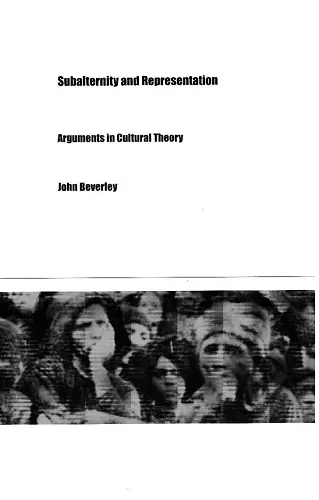Subalternity and Representation
Arguments in Cultural Theory
Format:Paperback
Publisher:Duke University Press
Published:22nd Dec '99
Currently unavailable, and unfortunately no date known when it will be back

The term “subalternity” refers to a condition of subordination brought about by colonization or other forms of economic, social, racial, linguistic, and/or cultural dominance. Subaltern studies is, therefore, a study of power. Who has it and who does not. Who is gaining it and who is losing it. Power is intimately related to questions of representation-to which representations have cognitive authority and can secure hegemony and which do not and cannot. In this book John Beverley examines the relationship between subalternity and representation by analyzing the ways in which that relationship has been played out in the domain of Latin American studies.
Dismissed by some as simply another new fashion in the critique of culture and by others as a postmarxist heresy, subaltern studies began with the work of Ranajit Guha and the South Asian Subaltern Studies collective in the 1980s. Beverley’s focus on Latin America, however, is evidence of the growing province of this field. In assessing subaltern studies’ purposes and methods, the potential dangers it presents, and its interactions with deconstruction, poststructuralism, cultural studies, Marxism, and political theory, Beverley builds his discussion around a single, provocative question: How can academic knowledge seek to represent the subaltern when that knowledge is itself implicated in the practices that construct the subaltern as such? In his search for answers, he grapples with a number of issues, notably the 1998 debate between David Stoll and Rigoberta MenchÚ over her award-winning testimonial narrative, I, Rigoberta MenchÚ. Other topics explored include the concept of civil society, Florencia Mallon’s influential Peasant and Nation, the relationship between the Latin American “lettered city” and the TÚpac Amaru rebellion of 1780–1783, the ideas of transculturation and hybridity in postcolonial studies and Latin American cultural studies, multiculturalism, and the relationship between populism, popular culture, and the “national-popular” in conditions of globalization.
This critique and defense of subaltern studies offers a compendium of insights into a new form of knowledge and knowledge production. It will interest those studying postcolonialism, political science, cultural studies, and Latin American culture, history, and literature.
“Bringing together aspects of cultural studies, Latin American studies, postcolonial theory, and subaltern studies, this is an important book. . . .” - K. TÖlÖlyan, Choice “[An] excellent book. . . . It is impossible to convey the richness and complexity of this book . . . I urge everyone interested in cultural politics and political culture at the dawn of the millennium to read it without delay.” - Edward Baker, Arizona Journal of Hispanic Cultural Studies "John Beverley’s Subalternity and Representation is an important and timely work. . . . It is, unquestionably, an invaluable addition to the field of cultural studies particularly for academic institutions interested in creating and/or maintaining dynamic programs capable of responding to the ever-changing landscapes of culture and identity. So too, for Latin American studies, Subalternity offers the opportunity to engage more fully and more critically the myriad of experiences and expressions that make up this New World." - Shelly Jarrett Bromberg, Jouvert "The tensions in Beverly's work indicate not so much a personal failure as the stubbornly difficult nature of the political and theoretical problems he investigates. Finally, the most important lesson he wishes us to learn-that academics must assume 'a new kind of responsibility for what we say and do'-is one with which even his harshest critic could agree." - Joseph Flanagan, interventions “A brilliant discussion of current debates in cultural studies and subaltern studies. Beverley’s style is vibrant, irreverent, subversive, and a pleasure to read. This is clearly one of the most interesting contributions to subaltern studies since Ranajit Guha’s definition of the field in the early 1980s.”-JosÉ Rabasa, University of California, Berkeley “An excellent, compelling overview and mise en question of subaltern studies. At once clear and conceptually sophisticated, this book engagingly rehearses many of the basic issues, texts and problems of the field but is in no way derivative. It is an intelligent, thorough, thoughtful ‘reading’ of an increasingly important area of study.”- Brad Epps, Harvard University “[An] excellent book. . . . It is impossible to convey the richness and complexity of this book . . . I urge everyone interested in cultural politics and political culture at the dawn of the millennium to read it without delay.” - Edward Baker (Arizona Journal of Hispanic Cultural Studies) “Bringing together aspects of cultural studies, Latin American studies, postcolonial theory, and subaltern studies, this is an important book. . . .” - K. Tölölyan (Choice) "John Beverley’s Subalternity and Representation is an important and timely work. . . . It is, unquestionably, an invaluable addition to the field of cultural studies particularly for academic institutions interested in creating and/or maintaining dynamic programs capable of responding to the ever-changing landscapes of culture and identity. So too, for Latin American studies, Subalternity offers the opportunity to engage more fully and more critically the myriad of experiences and expressions that make up this New World." - Shelly Jarrett Bromberg (Jouvert) "The tensions in Beverly's work indicate not so much a personal failure as the stubbornly difficult nature of the political and theoretical problems he investigates. Finally, the most important lesson he wishes us to learn-that academics must assume 'a new kind of responsibility for what we say and do'-is one with which even his harshest critic could agree." - Joseph Flanagan (interventions)
ISBN: 9780822324164
Dimensions: unknown
Weight: 381g
224 pages